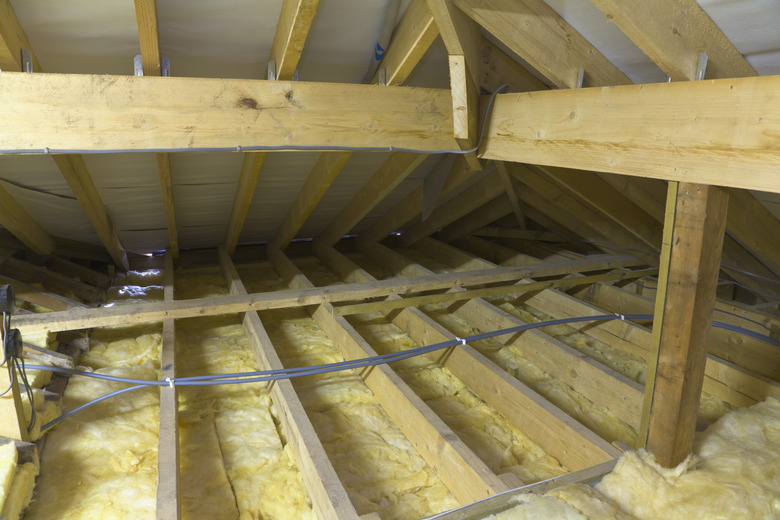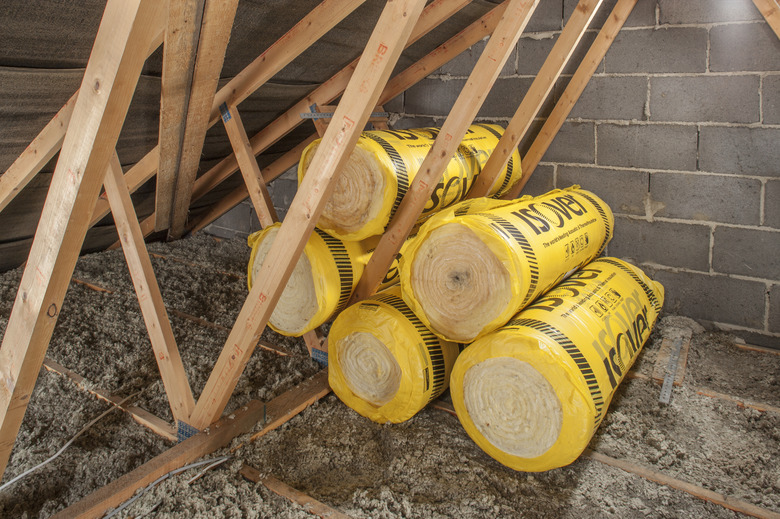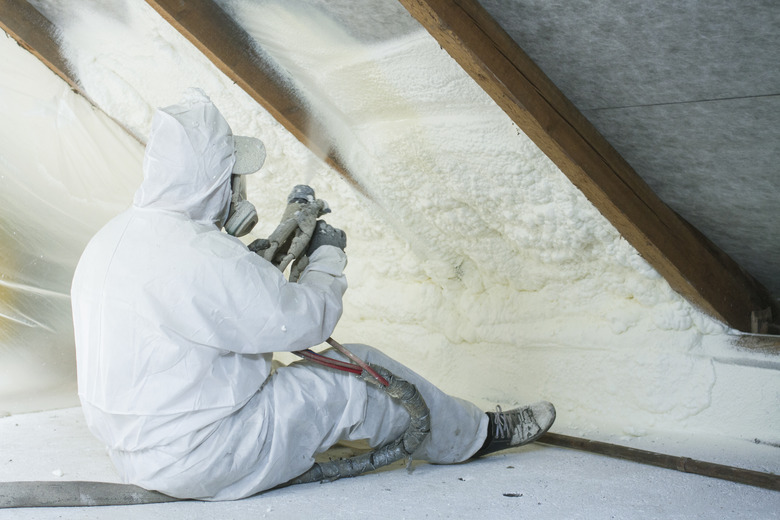What To Know Before You Hire Insulation Contractors (And How Much It Costs)
When your home feels cold in the winter and hot in the summer even when the furnace or air conditioner is on, you probably need to upgrade the insulation, and while insulation cost is a consideration, it shouldn't be a deterrent. Beefed-up insulation will reduce thermal transfer between the walls, roof, and floors and will lower your energy costs, and the energy savings should pay for the new insulation in just a few years.
Homeowners looking to add more home insulation have more than one option, and depending on the type of insulation and where it needs to go, they can sometimes do the work themselves. Most home heat is lost through the attic, and whether you choose to install blown-in cellulose or fiberglass batt attic insulation, it's often a DIY job assuming the absences of roof leaks, non-insulation-contact recessed light fixtures, and exhaust fan vent ducts that shouldn't be there in the first place. DIY-savvy homeowners can also insulate finished walls and crawl spaces, although these jobs are better handled by an insulation contractor with the right equipment. Spray foam is one of the most effective types of insulation, but it definitely needs professional installation, and the best time to do the job is during new construction or during remodeling before the wall cavities are covered with drywall.
Besides helping you decide on the best type of insulation to use and installing it correctly, an insulation contractor will determine how much you need. If you live in a house that predates the early 1990s and you have vermiculite insulation, an insulation contractor will also identify existing insulation that may contain asbestos so you can have it removed by a licensed asbestos abatement contractor.
Ready to hire an insulation contractor? Here's what you need to know — including how much it costs.
What an Insulation Contractor Does
In the most general terms, an insulation contractor is someone who installs thermal insulation, but not all insulation contractors install every type of insulation. In particular, installation of spray foam insulation requires specialized spray equipment and protective gear, and some contractors specialize in this type. Insulation contractors who don't specialize generally install all other types of insulation, including batt, radiant barrier, and loose-fill insulation, and some may also install spray foam.
Besides actually installing insulation, an insulation contractor can advise the homeowner on the amount of material needed to achieve the optimal R-value (a measure of thermal protection) based on the thermal characteristics of the building and an energy audit, which is an assessment of the home's energy usage. During the consultation, the insulation contractor may inspect the attic, basement, and walls for leaks that may need repair before the insulation can be installed, and in many cases will fix them as part of the job. The insulation contractor may uncover evidence of pest damage, but it's usually the homeowner's responsibility to hire a pest control expert to take care of that as well as an electrician to fix any wiring damaged by pests.
When installation begins, the job of the insulation contractor includes some key tasks:
- Removing and disposing of old, damaged insulation. If the house is old enough to have asbestos insulation and a test reveals that it does, you need an asbestos insulation removal contractor who is required by most states to have a special EPA-approved license.
- Installing insulation. Depending on the type of insulation, this may require cutting batts and fitting them around pipes, wires, and heating or air conditioning ducts. It may also involve cutting holes in finished walls to blow in loose-fill insulation.
- Securing insulation with staples, tape, or screws as needed.
- Installing barriers to protect the insulation from moisture.
Other than cutting and patching holes for loose-fill insulation, the responsibilities of an insulation contractor do not include repairs to walls, floors, or ceilings. Some insulation contractors may agree to do this work for an extra charge, but others won't.
Doing Your Homework
Because some contractors specialize in certain types of insulation, homeowners should have a basic idea of the installation materials and installation methods they might need before they start looking for one. Options include:
- Batt and roll insulation: Fiberglass batts and roll insulation are designed to fit snugly between wall studs and floor joists and are among the most commonly used insulation materials. Batts made of highly fire-resistant mineral wool (rock wool) are also available as are alternative materials, like cellulose and denim. Batts and rolls are typically installed in walls and floors during new construction or remodeling because the framing has to be exposed, but you can install them in the attic space and crawl space at any time.
- Loose-fill insulation: Typically made from fiberglass or cellulose treated with a flame retardant, loose-fill insulation has to be blown in with an insulation blower. Installers can blow it behind existing drywall by cutting holes and patching them later, and like batts and rolls, it can be installed in an attic space at any time.
- Rigid foam board: This material is easy to cut to fit between wall studs and floor joists. It's a perfect material for uncovered surfaces, such as attic roofs and the underside of floors because rigid foam board can be glued to plywood and won't sag or separate the way batts do.
- Radiant barrier: Often used in attics and on exterior walls to reflect incident sunlight and reduce heat gain, radiant barriers are often included on one or both sides of foam boards, but reflective barriers can also be installed independently of other forms of insulation.
- Spray foam insulation: Closed cell spray foam is one of the best insulation materials there is, and it also adds structural strength. It's applied to the interior sheathing between studs, joists, and rafters during remodels or new construction in a process similar to spray painting. DIY spray kits are available, but installing spray foam is potentially extremely messy and is best left to a contractor.
Homeowners can make a rough estimation of the home insulation costs by measuring the square footage of the walls, floors, and ceilings that the insulation has to cover.
- Batts, rolls, radiant barriers, and rigid foam board are sold by the square foot in various thicknesses, with increments corresponding to higher R-values.
- Loose-fill insulation can be applied at any desired thickness on attic floors, but when used for wall insulation, it's usually applied to the depth of the wall cavity. You determine the number of bags you need by calculating the area, dividing by the thickness, and dividing that by the coverage of one bag of insulation.
- Spray foam is measured in board feet, where one board foot is a square foot with an inch of thickness (so you need 3 board feet to cover a square foot to a thickness of 3 inches).
Preliminary cost estimates you make on your own will typically be material costs only and won't include labor cost, which varies according to locality, size of the job, and the contractor you choose. Don't forget that insulation upgrades often earn you federal or state tax credits or qualify you for incentives, such as energy-efficient home financing.
Why Hire an Insulation Contractor?
An insulation project isn't as demanding as some other home improvement projects; most insulation materials are lightweight and easy to cut and install. To get the maximum energy efficiency from your insulation, however, you have to install the insulation without gaps that can let air pass through, and that can be difficult in wall, floor, and ceiling cavities with small leaks and a lot of pipes, wires, and HVAC ducts. A contractor will usually seal those leaks and has the tools and techniques to do the installation properly, ensuring you get the maximum savings on your energy bills.
If you aren't sure what type of insulation to install or how much you need, it's part of a contractor's job to help you with that. Besides that, insulation installation is a messy job, especially if you have to remove old insulation, so instead of exposing yourself to itchy fiberglass or spray foam that's impossible to remove from your clothes, you can relax while a contractor's team does all the dirty work.
The Cost of Hiring an Insulation Contractor
Insulation cost depends on a number of factors, including insulation material and method, the size of the space to be insulated, the amount of insulation needed, and whether the wall cavities are exposed or not. With a cost per square foot between 50 cents and $2, blown-in cellulose and spray foam are the most expensive, while installation of fiberglass batt, rigid foam, and radiant barrier insulation can cost from 20 cents to $1.50 per square foot. In general, the average cost for insulation installation for an average-size home is between $1,400 and $6,300.
Choosing the Right Insulation Contractor
As you do with any other home improvement contractor, you should expect quality workmanship when you hire an insulation contractor, and the best way to guarantee that is to check references. Attention to detail is particularly important when you're hiring a contractor to install loose-fill in existing walls because patching holes in the wall after blowing in the insulation calls for skill and experience.
The main determinant for most people is the total cost of the project. It's recommended to get insulation cost estimates from several contractors and advises homeowners not to be surprised if the estimates vary, sometimes as much as two-fold. The difference may be attributable to the fact that one contractor is meticulous about sealing air leaks before the actual installation begins, while another puts little energy into this or doesn't do it at all, so be sure to ask.
When installing attic insulation, you'll want to be sure your contractor constructs dams around non-IC recessed lights (or replaces them), reroutes exhaust vents, and either fixes roof and plumbing leaks that could damage the insulation or at least alerts you to these problems so you can hire someone else to fix them.
Insulation Contractor Licensing and Certification
Although an insulation contractor can seek licensing as an insulation and acoustical contractor, which some states (such as California) require, most states will allow insulation contractors to operate as general contractors. Not all states require general contractors to be licensed at the state level, although many of those that don't require licensing at the state level do require licensing at the local level. Any insulation contractor you hire should have at the bare minimum a business license and insurance to cover you in the case of an accident.
A reputable insulation contractor will belong to an organization, such as the Insulation Contractors Association of America or the National Insulation Association. Searching the database for an organization such as this is a good way to find a reputable contractor in your area.
Accreditation by such an organization guarantees that the contractor is up to date on current materials and insulation techniques. If you need to hire a contractor to remove insulation that contains asbestos, that contractor requires special licensing issued by the state and approved by the U.S. Environmental Protection Agency.
References
- RetroFoam of Michigan: What is an Insulation Contractor?
- HomeAdvisor: How Much Does Insulation Cost?
- Harbor Compliance: Asbestos Abatement Company Licensing
- Energy.gov Energy Saver: Types of Insulation
- Insulation Institute: Incentives to Reduce Insulation Costs
- Energy.gov Energy Saver: Incentives and Financing for Energy Efficient Homes


